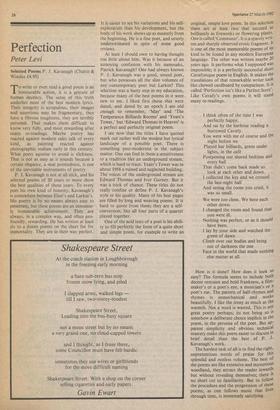Perfection
Peter Levi
Piro write or even read a good poem is an 1 honourable action, it is a gesture of human decency. The sense of this truth underlies most of the best modern lyrics. Their integrity is scrupulous, their images and assertions may be fragmentary, they have a fibrous toughness, they are terribly personal. That makes them difficult to know very fully, and most rewarding after many re-readings. Maybe poetry has reacted against modern sales talk of every kind, as painting reacted against photographic realism early in this century. What poets agonise to avoid is slickness. That is not as easy as it sounds because a certain elegance, a neat pointedness, is one of the inevitable instruments of poetry.
P. J. Kavanagh is not at all slick, and his selected poems of 20 years or more show the best qualities of those years. To every poet his own kind of honesty; Kavanagh's is somewhere between Eliot's and Larkin's. His poetry is by no means always easy to penetrate, but these poems are an immense- ly honourable achievement. They are always, in a complex way, and often pro- foundly, rewarding. He has written at least six to a dozen poems on the short list for immortality. They are in their way perfect. It is easier to see his variations and his self- exploration than his development, but the body of his work shows up as masterly from the beginning. He is a fine poet, and utterly underestimated in spite of some good reviews.
At least I should own to having thought too little about him. Was it because of an annoying confusion with his namesake, Patrick Kavanagh? One had always known P. J. Kavanagh was a good, sound .poet, but who possesses all the slim volumes of any contemporary poet but Larkin? This selection was a hasty step in my education, because many of the best poems in it were new to me. I liked first those that were dated, and dated by an epoch I am old enough to remember, 'May' and 'The Temperance Billiards Rooms' and `Yeats's Tower,' but 'Edward Thomas in Heaven' is a perfect and perfectly original poem.
I see now that the titles I have quoted mark out rather well the modest but lyrical landscape of a possible poet. There is something post-modernist in the subject matter. One can find in them a sensitiveness to a tradition like an underground stream, which is hard to trace. Yeats's Tower was in about 1958 a ruined and neglected building. The voices of the underground stream are Edward Thomas and Ivor Gurney. But it was a trick of chance. These titles do not really confine or define P. J. Kavanagh's style or his quality. Many of his best pages are filled by long and weaving poems. It is hard to quote from them; they are a self- conversion, like all four parts of a quartet played together.
One of the acid tests of a poet is his abili- ty to fill perfectly the form of a quite short and simple poem, for example to write an original, simple love poem. In this selection there are at least two that succeed as brilliantly as fireworks or flowering plants. One is called 'Commuter'. It is a sparely writ- ten and sharply observed erotic fragment. It is one of the most memorable poems of its kind to be found in any modern European language. The other was written maybe 20 years ago. It performs what I supposed was impossible; it is a perfectly successful short Cavafyesque poem in English. It makes the translations of that remarkable writer look like chewed cardboard by comparison. It is called 'Perfection isn't like a Perfect Story'• Like Cavafy's own poems it will stand many re-readings.
I think often of the time I was perfectly happy.
And sat by the harbour reading a borrowed Cavafy.
You were with me of course and the night before we Played bar billiards, green under lights, in the cafe Postponing our shared bedtime and every ball That didn't come back made us look at each other and down.
I collected the key and we crossed the late-night hall And seeing the room you cried, it was so small.
We were too close. We bore each other down.
I changed the room and found that you were ill. Nothing was perfect, or as it should have been.
I lay by your side and watched the green of dawn Climb over our bodies and bring out of darkness the one Face in the world that made nothing else matter at all.
How is it done? How does it look so easy? The formula seems to include both decent restraint and bold frankness, a film- maker's or a poet's eye, a musician's or a poet's ear. The pattern of half-rhymes and rhymes is unmechanical and works beautifully. I like the irony as much as the warmth. Not a word is wasted. This is not great poetry perhaps; its not being so is somehow a deliberate choice implicit in the poem, in the persona of the poet. But ap- parent simplicity and obvious technical mastery make this poem easier to discuss in brief detail than the best of P. J. Kavanagh's work.
The hardest task of all is to find the right, . unpretentious words of praise for this splendid and restless volume. The best of the poems are like extensive and mysterious woodland, they attract the reader inwards but without revealing themselves; there is no short cut to familiarity. But to follow the procedure and the progression of these poems, as one follows music that lives through time, is immensely satisfying.




































 Previous page
Previous page